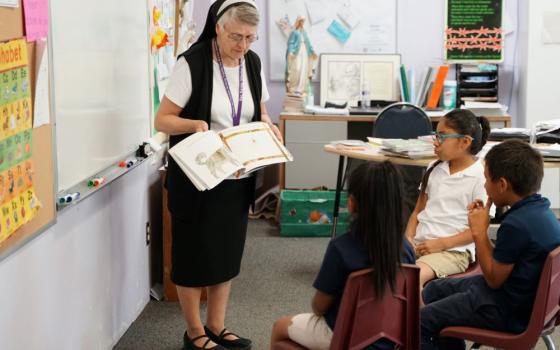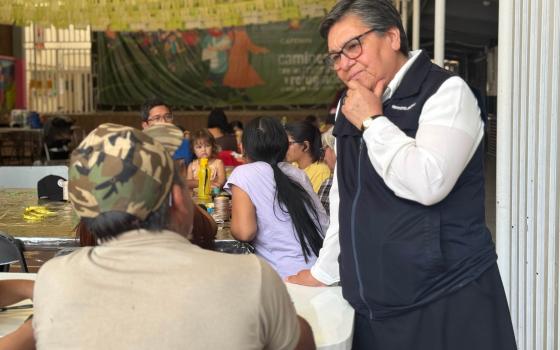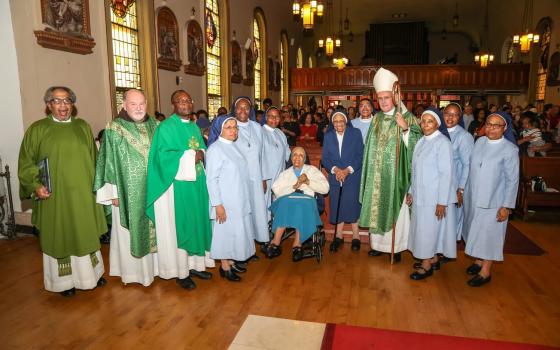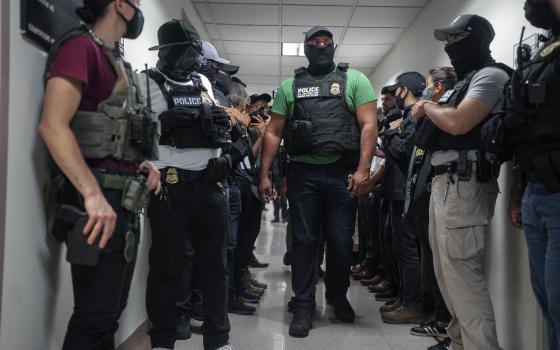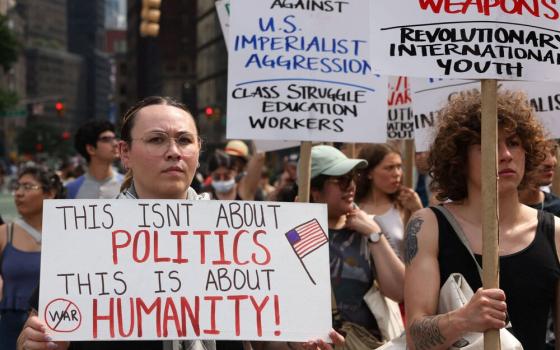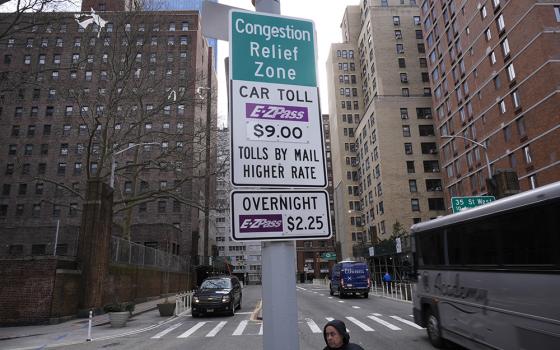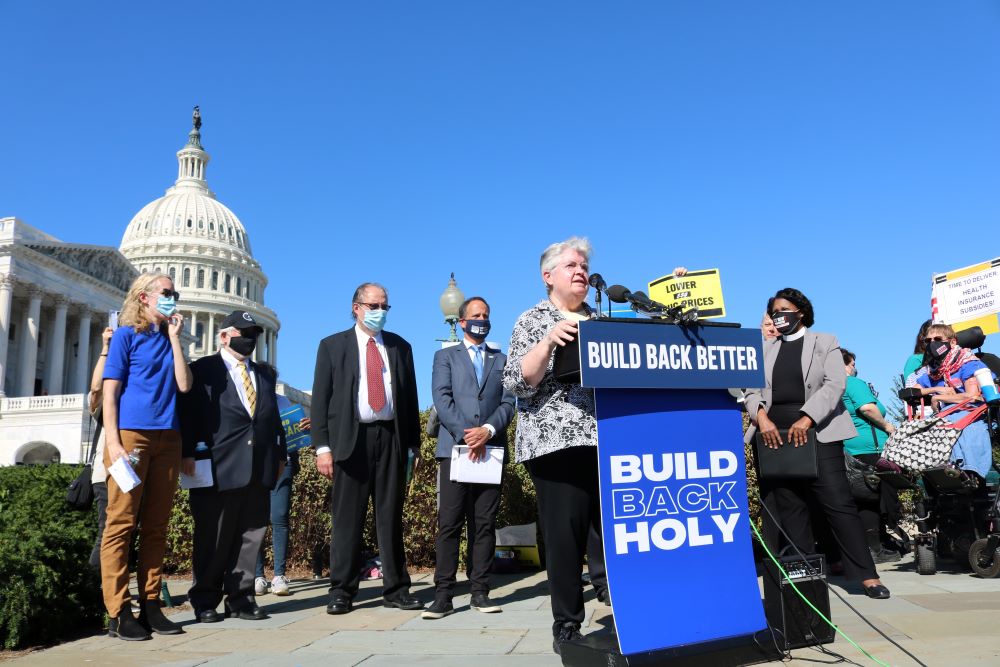
Carol Zinn speaks at Build Back Better event: St. Joseph Sr. Carol Zinn speaks at the Oct. 20 interfaith event calling for Congress to pass President Joe Biden's "Build Back Better" legislation at the U.S. Capitol in Washington, D.C. (Courtesy of NETWORK Lobby for Catholic Social Justice)

U.S. sisters joined faith leaders Oct. 20 for a 12-hour interfaith event on the grounds of the U.S. Capitol calling for Congress to pass President Joe Biden's "Build Back Better" legislation.
The legislation is an ambitious agenda that its supporters say will advance a more equitable national economy as well as racial equity and action on climate change.
"History has its eyes on you. History has its eyes on us," Sr. Carol Zinn, a Sister of St. Joseph of Philadelphia and the executive director of the Leadership Conference of Women Religious, or LCWR, said during the public event, held on the west side of the Capitol.
Evoking a famous dictum by St. Teresa of Kolkata rooted in Jesus' declaration in Matthew 25 — "You did it to me" — Zinn said the legislation offers a hopeful vision that mirrors the work of Catholic sisters to create a fairer and more compassionate country.
"Build back better for all," she said, repeating the public theme of the event and the proposed legislation.
An organization belonging to the Washington Interfaith Staff Community anchored each hour of the daylong event, which included prayers, testimonies and public calls for change.
Also participating were Network, a Catholic social justice lobby; the Sisters of the Good Shepherd's National Advocacy Center; Pax Christi USA; and Georgetown University's Center on Faith and Justice.
A U.S. Secret Service officer arrests Dominican Sr. Quincy Howard during an Oct. 5 protest for voting rights near the White House. Howard and four others were held in jail overnight but not charged. (CNS/Reuters/Leah Millis)
Following her Oct. 5 arrest for participating in a peaceful demonstration outside the White House, Sr. Quincy Howard of the Dominican Sisters of Sinsinawa, Wisconsin, says further actions are planned in Washington, D.C., while Republicans block efforts to promote federal voting rights legislation.
"The goal is for President Biden to use his full power to ensure that the Senate finds a path to passage for the Freedom to Vote Act and John Lewis Voting Rights Advancement Act," Howard told Global Sisters Report in a recent email.
Advertisement
On Oct. 20, Senate Republicans blocked action on voting rights legislation for the third time this year, prompting new calls for Senate Democrats to change rules permitting filibusters.
Howard, who is the coordinating director of advocacy, outreach and campaigns for the Faithful Democracy coalition and a government relations advocate at Network, said organizers of the demonstration are planning more actions through November "for as long as these bills are stuck by the filibuster."
Organizers of the protests include the League of Women Voters, People for the American Way and Declaration for American Democracy.
Howard and other demonstrators spent one night in jail after their Oct. 5 arrest and were later released.
A woman holds a child at a makeshift camp in Azaz, Syria, on Feb. 14, 2020. Syria was ranked second to last (after Afghanistan) in the 2021/22 Women, Peace and Security Index, which documents progress for women worldwide. (CNS/Reuters/Khalil Ashawi)
Index for women finds 'sobering results'
The global pandemic is slowing progress for women worldwide, with "widening disparities across countries," according to the latest Women, Peace and Security Index by the Georgetown Institute for Women, Peace and Security and the Peace Research Institute Oslo.
"The results are sobering," Jeni Klugman, the Georgetown institute's managing director and lead writer for the study, writes in the preface to the latest index, launched during an Oct. 19 online event.
The disparities reflect "worsening of inequalities in the status of women, as countries at the top continue to improve while those at the bottom get worse, mirroring global trends in wealth and income inequality," Klugman writes, noting that the pandemic "has triggered multiple and overlapping crises, magnifying existing inequalities.
"For women, major challenges have worsened on several fronts — not least juggling paid jobs and unpaid care work — and have exacerbated threats to safety."
The countries with the best ratings are Norway, Finland and Iceland. At the bottom of the list are Yemen, Syria and, at 170th place, Afghanistan. The United States is ranked 21st.
The range of scores globally has widened from the first survey in 2017, the study said: In the 2021/22 study, the top score is three times higher than the bottom one. In 2017, the best "performer" was twice as good as the worst.
"Progress is nowhere near what it needs to be," Melanne Verveer, director of the Georgetown institute and former U.S. ambassador for global women's issues, said during the online event. "We have our work cut out for us."
In her study preface, Klugman said the Taliban's recent takeover of Afghanistan means the results "are especially relevant at a time when Afghan women and girls face major threats to their basic rights and well-being."
"Our analysis reveals a precarious situation in many [Afghan] provinces where women and girls were already experiencing severe constraints on their opportunities outside the home and extremely high rates of violence," she wrote.
The index notes it "captures and quantifies" a number of factors: women's inclusion in economic, social and political realms; formal laws and the prevalence of discrimination; and levels of security for individuals, communities and society.
The index also examined province or state differences in Afghanistan, Pakistan and the United States.
"State performance varied greatly in the United States, with top-ranking Massachusetts scoring more than four times better than bottom-ranking Louisiana," the study states.
All six states in the northeastern United States scored among the 10 best nationally, the study said, while all five of the worst performing states are in the Southeast.

